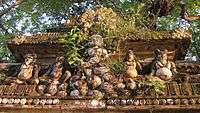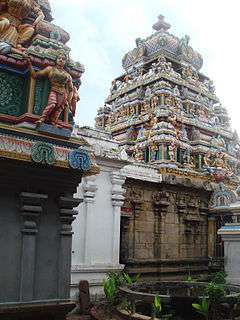Pancha Ishwarams
The Pancha Ishwarams (five abodes of Shiva) (Tamil: பஞ்ச ஈஸ்வரங்கள், Pancha Eeswaramkal) were built to honor the Hindu god Shiva. The temples are located on different directions near coastal area of Sri Lanka. Hindus believe these five abodes of Shiva already existed during the time of Ravana. These temples were looted and destroyed during the Portuguese colonial period in Sri Lanka.
The erudite scholar and historian, Dr.Paul E.Pieris declared in 1917, at a meeting of the Royal Asiatic Society (Ceylon Branch), that:[1]
| “ | Long before the arrival of Vijaya there was in Lanka five recognised Ishwarams of Shiva which claimed and received adoration of all India". | ” |
List of the Pancha Ishwarams
| Name | Image | Direction | District | Info |
|---|---|---|---|---|
| Naguleswaram |  | North | Jaffna | Naguleswaran is also called "Keerimalai Kovil" and is located in Keerimalai. |
| Ketheeswaram | .jpg) | North West | Mannar | Ketheeswaram or Tirukkētīsvaram is one of the 275 Paadal Petra Sthalams of Shiva glorified in the poems of the Tevaram. |
| Koneswaram | | East | Trincomalee | Koneswaram or Tirukoneswaram is the most popular among the five Iswarams. Koneswaram is also known as "Then Kailayam" (Kailash of the South), because it lies on the same longitude as Mount Kailash in the Himalayas.[2] |
| Muneswaram |  | West | Puttalam | According to legend, Rama has visited Muneswaram after his victory over Ravana. |
| Tondeswaram |  | South | Matara | Tondeswaram or Tenavaram temple differs from other Ishwarams by the architectural style. |
See also: List of Hindu temples in Sri Lanka
References
This article is issued from Wikipedia - version of the 1/24/2015. The text is available under the Creative Commons Attribution/Share Alike but additional terms may apply for the media files.